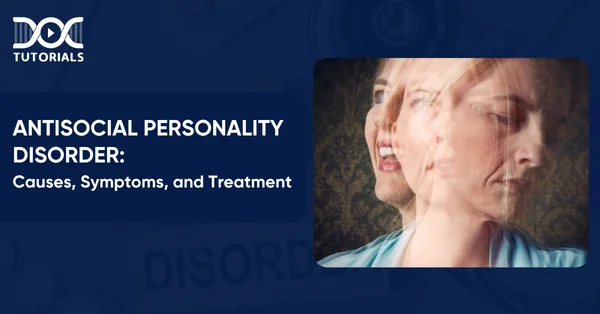Antisocial Personality Disorder: Causes, Symptoms, and Treatment

Antisocial personality disorder, as the name suggests, is a mental condition in which individuals often become manipulative, impulsive, and haphazard. They are mostly irresponsible in their work, home, or school duties. Besides, they do not feel any guilt for their behaviour, which may lead them to engage in criminal activities or violate the law and order.
Keep scrolling for a brief discussion of its symptoms, causes, and treatment methods.
What is Antisocial Personality Disorder?
ASPD, or antisocial personality disorder, is a mental disorder in which the patient disregards social norms and irritates others to the point of criminal behaviour. It is also referred to as “sociopathy”. Though this disorder is not a common condition, men are more likely to be affected by it than women.
What are the Causes of Antisocial Personality Disorder?
Though the exact cause of ASPD (antisocial personality disorder) is not yet known, a variety of factors, including a person’s nurture and nature, influence the condition. They are as follows:
- Genetics
In most cases, ASPD is found in individuals who are biologically connected to those with this disorder. It is less common among the general population. According to research, ASPD is predominantly inherited and may be exacerbated by environmental influences.
- Upbringing
Another crucial factor that influences ASPD is the upbringing of an individual. Those who have been dealing with trauma, childhood abuse, and neglect often develop this condition. For instance, children of dysfunctional and abusive parents learn their behavioural patterns and pass them on to their kids.
Furthermore, a child fails to develop discipline, empathy, and self-control if they grow up in a neglectful and disorganised home. All these can lead to mental disorders like ASPD.
- Brain Differences
The risk of ASPD is also accelerated by factors like abnormal brain function, smoking after conceiving, etc. As per research, individuals with ASPD have been diagnosed with differences in their brain’s frontal lobe, an area that helps in judgement and planning.
What are ASPD Risk Factors?
Though anyone can be affected by antisocial personality disorder, the risk of this condition may increase if the individual:
- Is male
- Has had a conduct disorder before 15 years of age
- Has a biological relative with SUD (substance use disorder) or the patient who is himself affected by SUD
- Experienced any childhood trauma or abuse
- Having biological family members with a history of mental disorders
- Those who have been imprisoned or jailed
- Those who have a lower performance in academics than their peers
What are the Symptoms of Antisocial Personality Disorder?
Antisocial personality disorder symptoms include the following:
- Lying to others to take advantage
- Not having the judgment of right or wrong
- Lack of sensitivity or respect for others
- Manipulating someone with wit or charm for pleasure or personal gain
- Criminal behaviour and having issues with the law
- Being highly opinionated and feeling superior to others
- Aggressive, threatening, violent, or hostile behaviour
- Committing dangerous acts without caring for the safety of others or themselves
- Harming others without any feeling of guilt
- Irresponsible behaviour without fulfilling any financial responsibilities
Those with antisocial personality disorder usually show conduct disorder symptoms before the age of 15 years. They include severe, persistent behavioural issues like:
- Destructing someone’s or own property
- Theft
- Being aggressive towards animals and people
- Dishonesty and lying
- Violating rules
How to Diagnose Antisocial Personality Disorder?
People with antisocial personality disorder (ASPD) often don’t recognise the need for help, though they may visit a doctor for issues like depression, anxiety, or substance abuse. They may not accurately report their symptoms, so input from family or friends can be valuable for diagnosis, provided it is taken with their consent.
Diagnosis typically starts with a medical evaluation to rule out other causes, followed by referral to a mental health professional experienced in ASPD. The process involves a mental health assessment that explores the following:
- Thoughts
- Emotions
- Relationships
- Behaviour patterns
- Family history
- Reviewing symptoms
- Personal and medical history.
ASPD is rarely diagnosed before age 18, but signs can appear in childhood or adolescence, often as conduct disorder. Key diagnostic criteria include the following:
- Persistent disregard for others’ rights
- Repeated deceit
- Impulsivity
- Aggression
- Irresponsibility
- Lack of remorse
How to Treat Antisocial Personality Disorder?
Antisocial personality disorder is challenging to treat because individuals rarely seek help voluntarily, often entering treatment only after legal issues. Punitive measures like incarceration tend to be ineffective, as those with ASPD usually do not respond well to punishment.
Treatment generally includes the following:
- Psychotherapy
Psychotherapy treatment may involve:
- Cognitive Behavioural Therapy (CBT): Helps individuals understand their behaviours and change harmful thought patterns. Positive outcomes generally require a long-term commitment.
- Group and Family Therapy: These therapies involve social support systems and can improve interpersonal relationships and behaviour.
- Mentalisation-Based Therapy (MBT): Focuses on enhancing the ability to recognise and understand one’s own and others’ mental states, showing promise in managing ASPD symptoms.
- Medication
Medications are not a cure for ASPD but can help manage specific symptoms such as aggression, anxiety, or mood swings. Commonly prescribed drugs include:
- Anti-anxiety medications
- Antidepressants
- Antipsychotics
- Mood stabilisers
These treatments, combined with consistent support, offer the best chance for managing ASPD symptoms effectively.
FAQs About Antisocial Personality Disorder
- Is it possible to prevent ASPD?
There isn’t a way to prevent antisocial personality disorder. However, if the individual has been diagnosed with conduct disorder before the age of 15 years, it is possible to reduce the risk of ASPD through early treatment.
- What is the prognosis of ASPD?
Antisocial personality disorder is a lifelong condition that becomes severe around age 20 and sometimes improves by age 40. Ongoing treatment is essential, as stopping therapy can worsen symptoms and increase risks for the affected individual and others.
- When should one consult with a healthcare provider?
Suppose you or someone you know is experiencing severe mood swings, self-injury, thoughts of suicide, or aggressive behaviour. In such cases, it’s essential to seek medical help immediately to ensure safety and support.
Conclusion
Mental well-being is as important as physical well-being. Thus, identifying the symptoms and causes of antisocial personality disorder helps adopt proper treatment at the right time. Those preparing for the NEET PG exam must have a sound understanding of this disorder, as it is an essential topic in their syllabus.
For professional guidance, you can seek assistance from DocTutorials. Our online courses are focused on preparing every medical student for a successful career. Additionally, our video lectures, detailed study materials, and best-in-class faculty are designed to provide equal effort and support to each student.Check out our NEET PG study materials today!
Latest Blogs
-

NEET PG Exam 2025- Date, Pattern, Marking Scheme, Subject Wise Weightage, and Exam Mode
NEET PG Exam 2025 is the ultimate gateway for medical graduates aspiring to pursue postgraduate courses in medicine, including MD,…
-

INI CET Exam 2025: Your Roadmap to Success – Key Topics, Strategies, and Lessons from Last Year’s Papers
The INI CET exam is more than just a test; it’s a significant milestone for many medical students aiming to…
-

INI CET Exam Success: Previous Year Question Papers & Ultimate Guide – INI CET PYQ
One can feel overwhelmed while preparing for the INI CET (Institute of National Importance Combined Entrance Test). A vast syllabus,…




